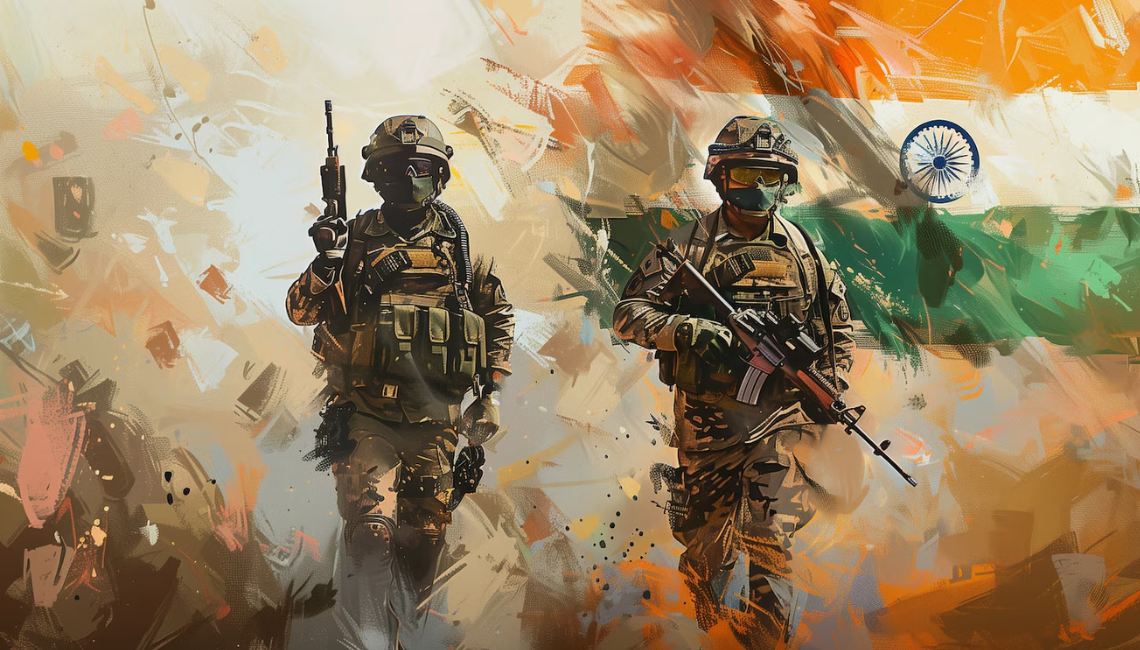India has a tense security situation since it is among the most populous democracies of the world. Its counter-terrorism system consists of intelligence, paramilitary, military and civilian authorities working together with the goal of protecting the security of the nation. The ever-changing nature of terror, whether it's transnational penetration or radicalization of residents, demands a seamless civil-military collaboration to protect the security of the nation's territorial integrity and the protection of order and the adherence to democratic principles.
Nature of Threats of Terror in India
Terrorism in India has assumed many forms including cross-border insurgency, left-wing extremism and urban terrorism. Among the most prevalent in the cross-border terrorism, directed towards Jammu & Kashmir and major metropolitan areas are Pakistan-based terrorist groups like the Lashkar-e-Taiba and Jaish-e-Mohammed. In such states, as Chhattisgarh, Jharkhand and Odisha, the Left extremist Naxalite movement is influential. In addition, there are the urban terror attacks that include the 26/11 Mumbai attacks in 2008, which highlight the strategic and psychological impacts of terrorism on Indian cities.
The central and state governments have the authority of ensuring law and order in the Indian states. Although internal security is on the state list, cross-border terrorism is a national issue and therefore should be responded to collectively by civil authorities and the military forces.
Counter-Terror Operations: Paramilitary and Military Action
The counter-terror operations by India are operated with a combination of armed forces, paramilitary and special units. The Indian Army has been undertaking surgical operations in the Line of Control (LoC) and high altitude places like Jammu & Kashmir. One notable example is Operation Vijay (1999) of the Kargil conflict that eliminated infiltrators who had crossed the LoC. Likewise, counter-infiltration operations are conducted constantly across the LoC and often in severe conditions of terrain and weather.
The National Security Guard (NSG) is a specialized security force for counter-terrorism in India that is equipped to carry out Hostage rescue operations, anti-hijacking, urban terror operations. Mumbai Attacks in 2008 proved the significance of the NSG which was vital in the removal of terrorists from areas such as Taj Mahal Palace Hotel, and Chhatrapati Shivaji Terminus. The gathering of operational intelligence, search and cordon and civil order activities are also conducted by paramilitary forces like the Central Reserve Police Force (CRPF), Border Security Force (BSF) and the Indo-Tibetan Border Police (ITBP) in areas with high risk.
Civil-Military Co-ordination Structures
Coordination between the civil and the military is necessary to be effective, non-duplicated, and democratic. The coordination within India is institutionalized with such structures as the Integrated Defence Staff (IDS) and the National Security Council (NSC) that make collaboration between civil and military agencies easier. The Directorate of Military Operations (DMO) with the help of the intelligence agencies such as the Research and Analysis Wing (RAW) and Intelligence Bureau (IB), provides timely and operational intelligence to facilitate operational planning.
Unified Command organization during the counter-terror activities at the state level allows a smooth coordination of the army, police, and the paramilitary forces. As an example, in anti-terror operations in Jammu & Kashmir, Operation All Out (2017) implied the collaboration of the Army, CRPF, and Jammu & Kashmir Police and had a significant impact on the reduction of terrorist acts. Civil authorities would offer legal control, humanitarian assistance, and media control, and make sure that the operations are within the regulations of national and international law, as well as human rights standards.
Significance to the UPSC Aspirants
As aspirants studying with the intention of taking the UPSC exams, it is important to note the counter-terror operations to realize how India tackles the issue of internal security and national integration clause of the syllabus on governance, security challenges and contemporary issues. The main issues to be emphasized are:
-
The functions of various security forces (Army, NSG, CRPF, BSF).
-
National and state systems of civil-military coordination.
-
Such case studies as the 26/11 Mumbai attacks, Operation All Out and the surgical strikes of 2016.
-
The provisions of the Constitution like 352 (National Emergency) and 355 (defense of a state against internal unrest).
-
The trade off between security and democratic accountability.
Conclusion
Counter-terror operations in India have shown the urgency of the need to have a cohesive response that would include precision in the military, effectiveness in intelligence, and civil control. These operations require the capacities of the armed forces as well as the successful civil-military coordination, adherence to laws, and community participation. In a world where India is increasingly confronted by changing security issues, it has been determined that strengthening these structures continues to be central in ensuring sovereignty, internal security and democratic values.







